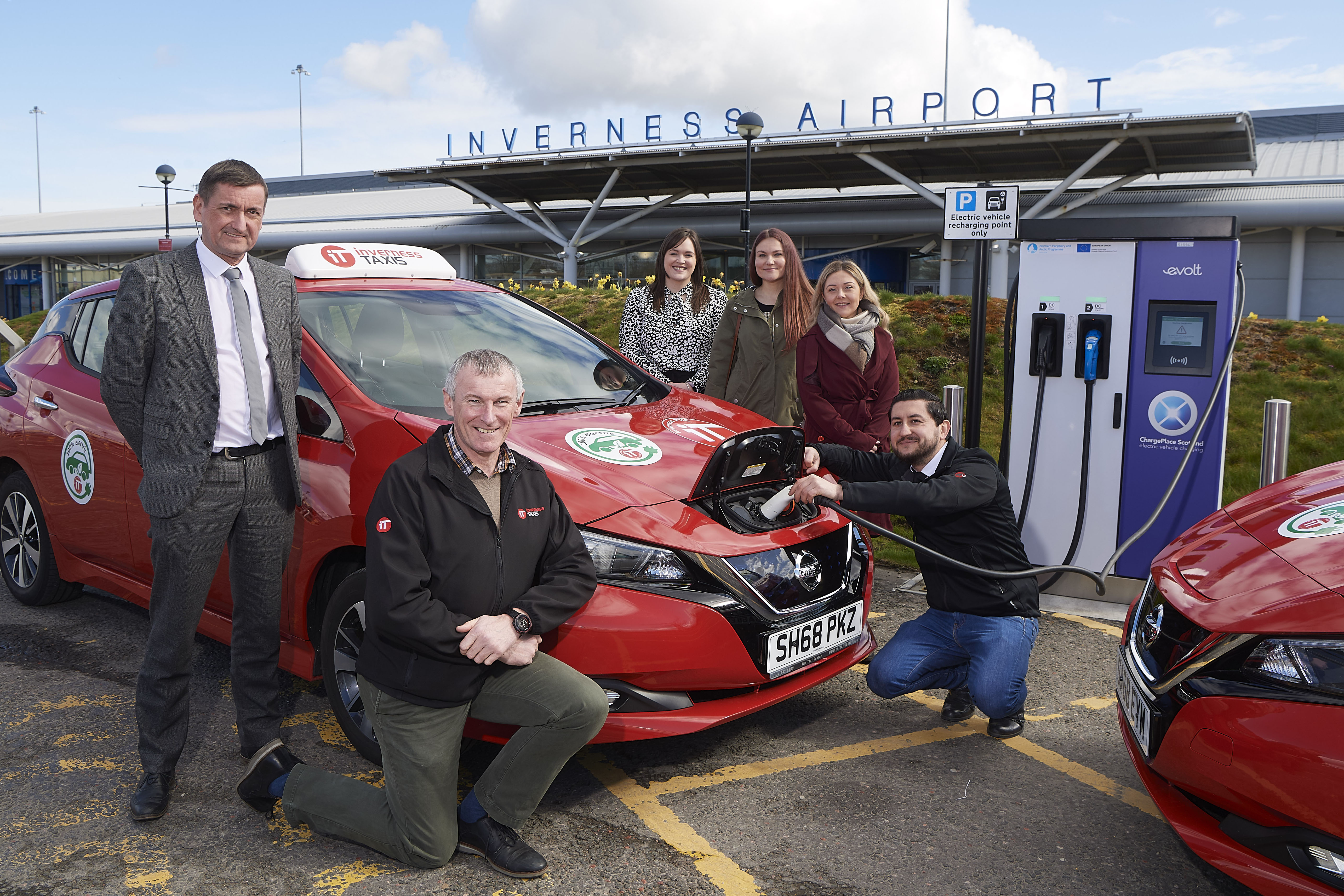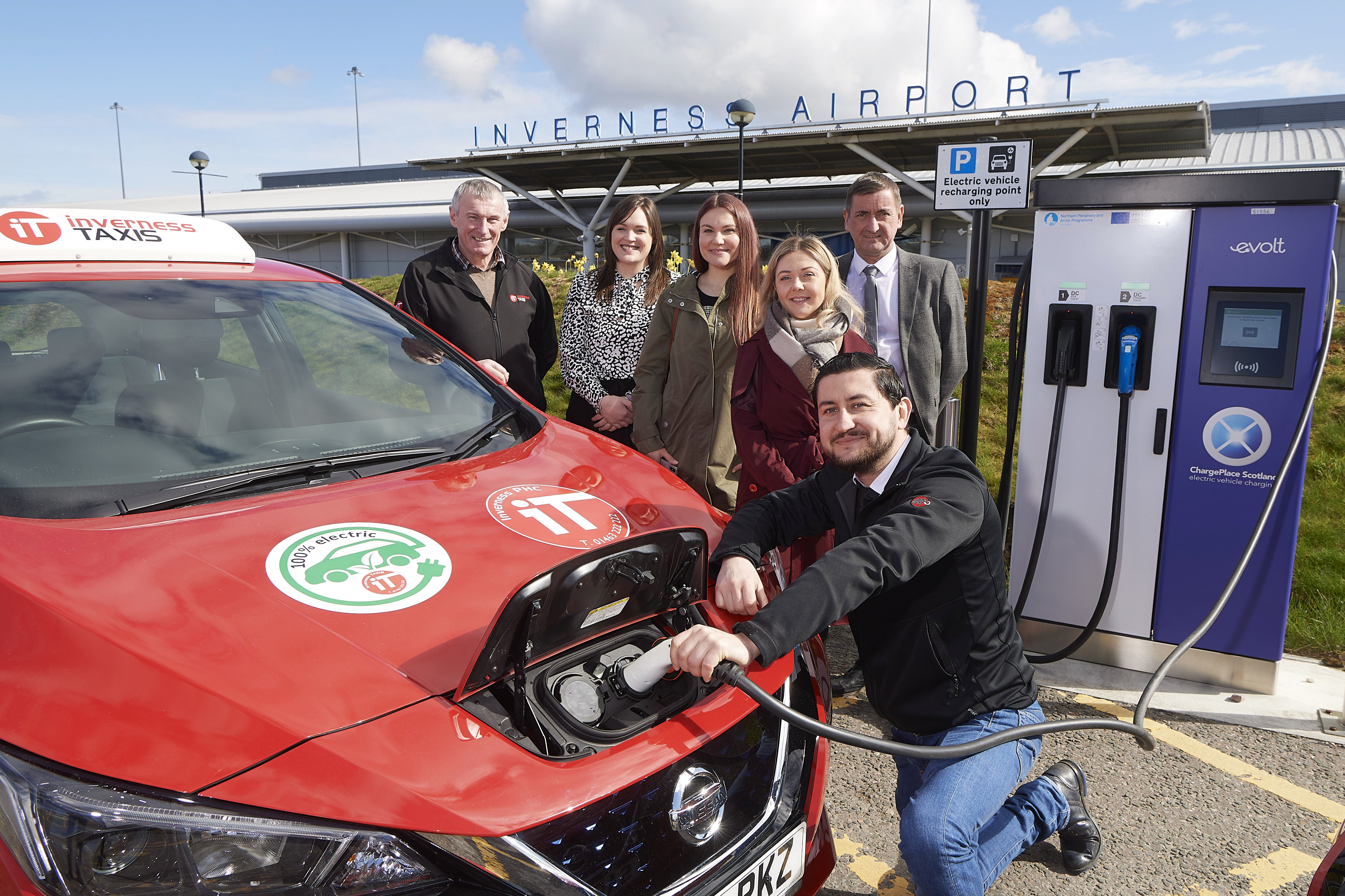4/11/2019 - Electric taxis take off at Inverness Airport
Inverness is the first airport in Scotland to have dedicated electric taxis – thanks to a Euro-funded project led by HITRANS, the regional transport partnership for the Highlands and Islands. Electric vehicle rapid charge points have been installed at Inverness Airport, Dalcross, as well as in Inverness city centre to allow local taxi firms to make the move to electric vehicles and offer low carbon transport services to and from Inverness Airport.
The project has been part-funded by Transport Scotland through the Energy Saving Trust (EST), and the SPARA2020 project – an Interreg Northern Periphery and Arctic (NPA) project part-funded by the European Regional Development Fund (ERDF). HITRANS was the lead partner of SPARA2020, with a key output being the introduction of low carbon surface access at remote and peripheral airports.
The project has involved close liaison with Highlands and Islands Airports (HIAL) and The Highland Council and collaborative work with international partners from Sweden, Norway and Ireland.
Councillor Allan Henderson, Chair of HITRANS and Chair of The Highland Council’s Environment Development and Infrastructure Committee, said: “This is an excellent Euro-funded project geared to reducing our carbon footprint. The experience and learning from Inverness Airport can be shared amongst other airports in the NPA area and beyond to help introduce more low carbon transport services at airports.”

Left to right: Graeme Bell (Inverness Airport), Gavin Johnston (Inverness Taxis), Jayne Golding (HITRANS), Kateryna McKinnon (HIE), Courtney Duddy (Inverness Chamber of Commerce), Wojciech Kobialka (Inverness Taxis)
Inverness Airport General Manager Graeme Bell said: “Electric vehicles are becoming more common on our roads and we are pleased that Inverness Taxis are able to make use of the new charging points. Highlands and Islands Airports Limited (HIAL), which operates Inverness, made the switch to 100% renewable energy-backed supply in 2018, taking an important step towards reducing our carbon footprint. We hope the introduction of electric taxis at the airport inspires other companies to switch to lower carbon energy sources.”
In 2017, Inverness Taxis were awarded a seven-year contract to serve Inverness Airport, and were keen to explore EV opportunities. Last year, Inverness Taxis were awarded a loan from EST and purchased two electric taxis, with plans to expand their electric fleet in the future.

Left to right: Gavin Johnston (Inverness Taxis), Jayne Golding (HITRANS), Kateryna McKinnon (HIE), Courtney Duddy (Inverness Chamber of Commerce), Graeme Bell (Inverness Airport), Wojciech Kobialka (Inverness Taxis)
Gavin Johnston, Managing Director of Inverness Taxis, said: “We are delighted to be the first and only taxi company to provide not only 100% electric but also the largest fleet of hybrid and luxury vehicles to all our customers. I believe that adapting and combining newest technology and innovation translates into greater cost efficiency and reduction of CO2 emissions we should be all working towards.”
Matthew Eastwood, Head of Transport in Scotland at Energy Saving Trust said: “We are delighted to provide funding for charging facilities at Inverness Airport and in Inverness City Centre. Sales of plug-in vehicles have been increasing every year and we have no doubt that this trend will continue due to the substantial fuel cost savings that can be achieved. Facilities like these are crucial in supporting the growing number of EV drivers in Scotland.”
For more information on the funding or to find out more about electric vehicles, visit http://www.energysavingtrust.org.uk/scotland/domestic/improving-my-travel
To further support sustainable transport, HITRANS developed low carbon transport strategies for Inverness and Kirkwall Airports through the SPARA project, and are facilitating electric bikes at Barra and Oban Airports. HITRANS also supported the electric bus currently operating between Kirkwall and Kirkwall Airport.
HITRANS is involved in several other EU projects with a green transport theme, including Interreg North Sea Region project G-PaTRA, trialling an electric bus in rural Morayshire in partnership with Moray Council; the MOVE project, working with NHS Highland to improve accessibility into main population centres from rural areas using environmentally friendly vehicles; and Stronger Combined, aiming to develop combined mobility services to build sustainable rural public transport services. The Horizon2020 project, INCLUSION, further demonstrates HITRANS commitment to renewable transport by trialling electric bikes in Cairngorms National Park. HITRANS is also the first in Scotland to develop an EV Strategy for the region.